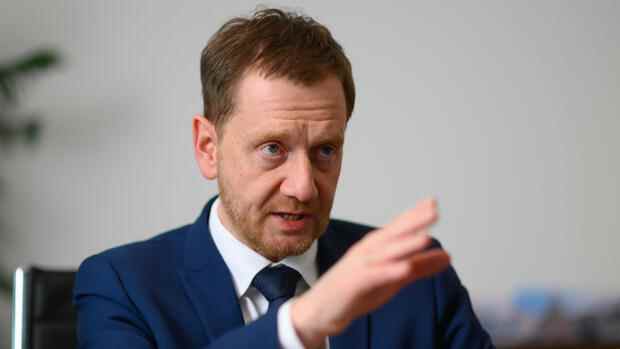The chairman of the Union parliamentary group in the Foreign Affairs Committee, Roderich Kiesewetter (CDU), told the Handelsblatt with a view to Kretschmer’s statements. “This is an absolute minority opinion in the Union, which is simply wrong because it only serves the Russian narrative.”
Kretschmer had declared that Germany had to mediate in the conflict between Russia and Ukraine and ensure “that this war is frozen”. He stressed that the Russian war against Ukraine was a crime and that Ukraine should not give up its territory. But the CDU politician also said with regard to Russian raw materials: “I am firmly convinced that we need these raw material supplies.”
CDU leader Friedrich Merz emphasized that there was no rethinking in the Union when assessing Germany’s and the EU’s sanctions policy against Russia: “It’s not crumbling.” He avoided making a direct reference to Kretschmer. Merz only spoke of “isolated voices” who saw it differently. But these are “really only isolated voices,” said Merz on Thursday at the end of the summer retreat of the CSU members of the Bundestag in the Upper Franconian monastery of Banz.
Top jobs of the day
Find the best jobs now and
be notified by email.
CSU regional group leader Alexander Dobrindt became clearer and stated that Kretschmer “does not represent the position of the CDU and CSU”. Kiesewetter accused Kretschmer of “pouring grist on the mill of Putin’s propaganda”.
Encouragement from the left and AfD
A “freeze of the war” only benefits Russia. “It could recover, reorganize the armed forces.” Foreign Minister Baerbock said to Kretschmer’s statement that Germany had to work to ensure that the war was “frozen”: “I don’t know what that’s supposed to mean.”
>> Read also: Interview with Alfons Mais: “Russia has resources that are almost inexhaustible”
Kiesewetter explained that this would give Russia time to look for other trading partners and routes “in order to then continue a broad attack on Ukraine, financially and militarily strengthened, and to attack countries such as Moldova, Georgia or the Baltic States, as Putin has clearly and repeatedly announced Has”.
Kiesewetter warned that with statements like those of Kretschmer “the danger is growing that Russia’s strategic goal of achieving a syrification of the war will get caught and that Ukraine will slowly be forced into a dictated peace that threatens its very existence, in which Germany and others simply deliver too little too slowly”. . Rather, it is important to enforce further sanctions “with full force” and to massively equip Ukraine with heavy weapons systems.
Left-wing politician Sahra Wagenknecht agreed with Kretschmer’s economic argument. “Russian raw materials and, above all, the relatively cheap Russian energy are the conditions of existence for a competitive German industry that we cannot do without.” And she added: “The economic war is ruining Germany, while it hardly harms Putin and dying in Ukraine does not completed.”
AfD boss Tino Chrupalla, who, like Kretschmer, comes from Saxony, explained that the prime minister is swinging towards the AfD line. Chrupalla also demanded that the Ukraine war must be ended through diplomacy. “Otherwise the sanctions regime with its catastrophic consequences for our prosperity will never end.”
How long will solidarity with Ukraine last?
Against this background, it is uncertain how long the solidarity of the German population with Ukraine will last. According to the ZDF Politbarometer, 70 percent of all respondents say that they want to continue supporting Ukraine in its defense against the Russian attack, despite high energy prices.
>> Read also: Lignite, pool heating ban, investment obligation: Habeck wants to prevent the gas crisis with a package of measures
But there are signs of a change in other opinion polls: In a Forsa poll, for the first time a narrow majority of Germans (51 percent) believed that the sanctions imposed on Russia harmed Germany more than Russia. In an Insa survey published shortly thereafter, it was almost 50 percent. The government is under no illusions that the mood could change completely if Russia were to stop supplying gas and energy prices continue to skyrocket.
This can also mean new tensions in the traffic light government. Because there are serious differences between the supporters of the three parties. Only the supporters of the Greens believed by a clear majority that the sanctions would hit Russia harder than their own country, says Forsa Managing Director Peter Matuschek of the Reuters news agency. The majority of SPD and FDP supporters, on the other hand, doubt Chancellor Olaf Scholz’s statement that the sanctions would harm Russia more.
More: Russia is turning on the gas tap again – these are the numbers that matter now
